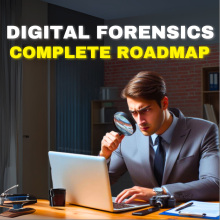
Your Complete Roadmap to Mastering Digital Forensics
"The world we live in today is increasingly digital. With the rise of technology, there’s a growing need for experts in digital forensics. Digital forensics is a field focused on recovering and investigating material found in digital devices. This area has become crucial due to the rise in cybercrime and data breaches."
Your Complete Roadmap to Mastering Digital Forensics

The world we live in today is increasingly digital. With the rise of technology, there’s a growing need for experts in digital forensics. Digital forensics is a field focused on recovering and investigating material found in digital devices. This area has become crucial due to the rise in cybercrime and data breaches.
The Growing Need for Digital Forensics Experts
The Rise of Cybercrime and Data Breaches: Statistics and Impact
The Role of Digital Forensics in Cybersecurity
cybersecurity is on the rise. In 2022, the FBI reported over 800,000 cyber incidents. These numbers can be shocking. Digital Forensics in Cybersecurity plays a crucial role in investigating and mitigating these threats. Data breaches can cost companies millions and affect millions of people's personal information.
- Statistics to note:
- In 2021, data breaches in the U.S. alone affected over 300 million people. -Cybercrime damages are expected to reach $10.5 trillion by 2025.
The Expanding Role of Cyber Forensics and Information Security in Investigations
Cyber forensics and information security play a vital role in solving crimes, from fraud to cyberbullying. Digital forensics assists investigators by providing tools to analyze electronic evidence, especially as every crime scene now has a digital component. This expertise is crucial for helping law enforcement agencies secure convictions and protect society in an increasingly interconnected world.
Why Now Is the Perfect Time to Begin Your Digital Forensics Journey
As technology continues to evolve, so do the tactics of criminals. The need for skilled professionals is growing. This is your chance to enter a rewarding and necessary field.
Foundational Knowledge: Essential Concepts and Skills
To succeed in digital forensics, grasp the foundational concepts. This knowledge will provide you a strong base for future learning.
Understanding Data Acquisition Techniques: Hardware and Software
Data acquisition is a key step in digital forensics. It involves collecting data from devices without altering it. Techniques include using write-blockers and various imaging tools.
Mastering Data Analysis Methods: File Carving, Network Forensics
Once you acquire data, you need to analyze it. File carving helps recover deleted files, while network forensics focuses on data traveling across networks. Understanding these methods will boost your investigative skills.
Legal and Ethical Considerations in Digital Forensics
Following laws is essential in digital forensics. Ethical standards protect individuals' rights. Stay informed about regulations surrounding data privacy and legal procedures.
Core Skills Development: Practical Techniques and Tools
Hands-on experience is vital for mastering digital forensics tools. Start with the popular forensic software available.
Hands-on Experience with Forensic Software: Autopsy, FTK, EnCase
Learn to use forensic software like Autopsy, FTK, and EnCase. Each tool offers unique features, enabling you to analyze data effectively. Familiarizing yourself with these programs will set you apart from others.
Developing Proficiency in Network Forensics: Packet Capture and Analysis
Network forensics involves monitoring network traffic. Tools like Wireshark will help you capture and analyze packets. This skill is invaluable for detecting unauthorized access or data losses.
Mastering Mobile Device Forensics: iOS and Android
Mobile devices are often central to investigations. Develop skills in extracting and analyzing data from iOS and Android devices. Understanding mobile forensics will enhance your capabilities significantly.
Advanced Topics: Specialization and Emerging Trends
Once you have a solid foundation, consider diving deeper into specialized areas of digital forensics.
Deep Dive into Malware Analysis: Reverse Engineering and Threat Hunting
Malware analysis is crucial for understanding cyber threats. Learn how to reverse engineer malware and conduct threat hunting to safeguard systems effectively.
Cloud Forensics: Investigating Data in the Cloud Environment
As more data moves to the cloud, understanding cloud forensics is essential. This involves investigating incidents in cloud environments, focusing on data ownership and accessibility.
Blockchain Forensics: Investigating Cryptocurrency Transactions
With the rise of cryptocurrencies, knowing how to analyze blockchain transactions is becoming increasingly valuable. Explore the tools and techniques to trace these transactions effectively.
Career Paths and Opportunities in Digital Forensics
As the demand for digital forensics experts grows, various career opportunities are available.
Job Roles and Salaries in the Digital Forensics Field
Typical job roles include digital forensics analyst, incident responder, and security consultant. Salaries vary, with entry-level positions starting around $50,000 and experienced roles exceeding $100,000, depending on expertise and location.
Networking and Building Your Professional Network
Networking is crucial for discovering job opportunities. Attend industry conferences and join online communities to connect with professionals in the field.
Certifications and Continuing Education: Building Credibility
Certifications like Certified Computer Examiner (CCE) and Certified Forensic Computer Examiner (CFCE) can enhance your credibility in the field of cyber security investigation. Continuing education keeps your skills fresh and demonstrates your commitment to staying at the forefront of this ever-evolving domain.
Conclusion: Your Journey to Becoming a Digital Forensics Expert Begins Now
Key Takeaways and Actionable Steps
- Start by gaining foundational knowledge and skills in digital forensics.
- Use hands-on experience with forensic tools and software.
- Consider specializing in advanced topics as you progress in your journey.
Resources for Continued Learning
Many online courses offer valuable insights into digital forensics. Websites like M Cyber Academy provide structured learning options to help you gain more knowledge.
The Future of Digital Forensics and Its Impact
As technology evolves, the field of digital forensics will expand. Embrace this journey, stay curious, and be part of shaping the future of cybersecurity. The demand for forensics experts will only continue to rise, making now the best time to start your path.